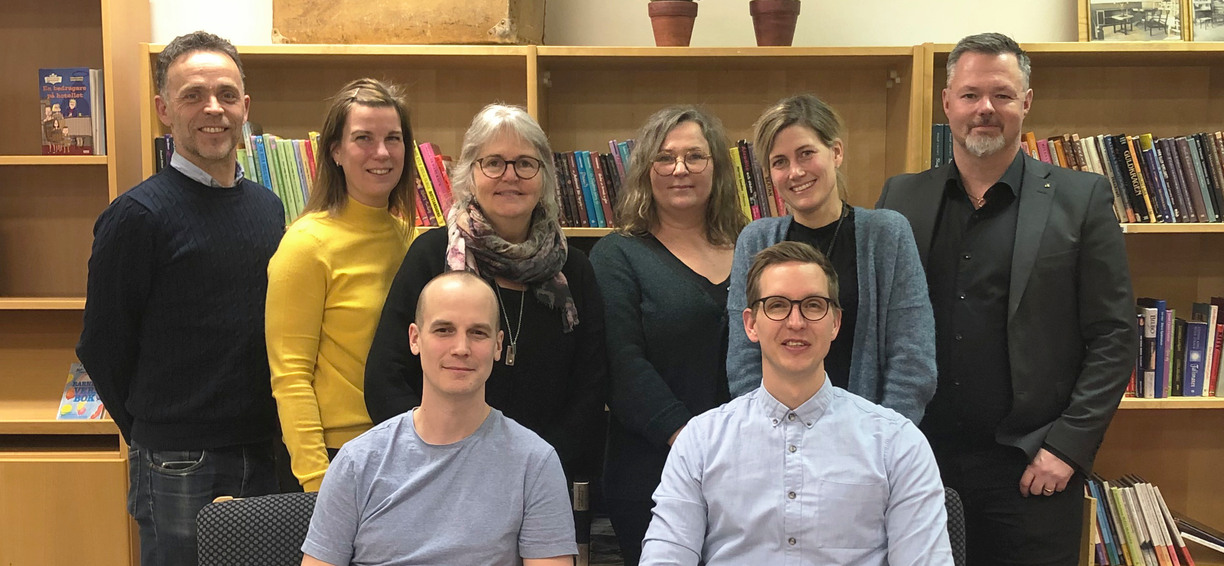
Eva Alerby och projektgruppen från Nya Läroverket i Luleå. Foto: Privat
Does it have to be fun all the time?
In the project we will work with and research student motivation. What is it that actually motivates students in school work?
Who are we?
Participants from NLV: Magnus Selberg, CEO, David Hjelte, SO, Katarina Harju, HKK and Eng, Camilla Sundberg, Sv and Bild, Peter Ohlsson, Head of School/Project Manager, Mimmi Lind-Löfgren, Bild and Anders Sundström, Ma/No.
Participants from LTU: Eva Alerby, professor and researcher in Education.
Area for R&D practice-related research
Students' motivation, especially when they reach secondary school, is something that teachers often struggle with. By extension, a lack of motivation also leads to a lack of perseverance, popularly known as "grit" in a more modern term. A consistent approach that Nya Läroverket sees as important is to build good relationships with the students. This is something that we also believe is an important factor for students' motivation and perseverance. The research area is something that is close to practice and the question is important for the profession. The hope is that the project will have a ripple effect and be taken further in other projects.
Purpose of the project
In the project we will work with and research student motivation. What is it that actually motivates students in school work? This will be the overall question, which will then be broken down into more questions. Why are certain areas of work more motivating for students? What kind of work? What input into the work? What stimulus from teachers drives and sustains student motivation? How does the teacher's relationship with students affect their motivation and persistence? How does the culture of the classroom affect students' motivation and persistence? What in the teacher's professional approach creates good relationships? What is the role of student participation in motivation?
Implementation and documentation
A total of six teachers from Nya läroverket's two schools will participate. They work in different teams and the teachers will work in separate classes during the project period. This will mean that it is year 7 and year 8 that are involved in the project during the first year, as the current year 9 students will have left primary school during the second year of the project. The project will start in spring 2020 and end at the end of 2021.
More specifically, the following activities, divided into 4 steps, will be carried out:
- Step 1: A small survey will be carried out together with the pupils. Students will also be asked to make written reflections, from open questions. The researchers supervise these two methods, while the teachers carry out the data collection. The analysis is done jointly and in collaboration between teachers and researchers.
- Step 2: Interviews with students - both individual interviews and focus group discussions. The researchers supervise the interview methodology, while the teachers conduct the interviews and transcription. The analysis is done jointly by teachers and researchers.
- Step 3: Work with images for the students to illustrate their answers from the interviews. Images can be painted, photographs and moving images. The researchers supervise the use of images as a data collection method, while the teachers carry out the data collection. The analysis is done jointly by teachers and researchers.
- Step 4: Compile what has emerged in steps 1, 2 and 3. Based on these results, methods/tasks are developed for how to work to meet what has emerged in the project, i.e. an implication and implementation phase. The teachers in the project will carry out various activities and disseminate this to all colleagues in the schools. This includes documenting and reflecting on this work. The researchers are actively involved in this whole process.
Eva Alerby from LTU will throughout the project supervise the teachers, and also actively, in close collaboration with the teacher group, to participate in all phases of the project. The entire project group will meet regularly, about once a month during the project period. In connection with the start and end of the project, the meetings may become more frequent.
Dissemination of results
To disseminate the results, the teachers and researchers will present the project to other teachers and staff in the schools. It is also planned that teachers and researchers will jointly publish articles and present papers at conferences and open seminars for student teachers, teachers and head teachers.
Updated:
